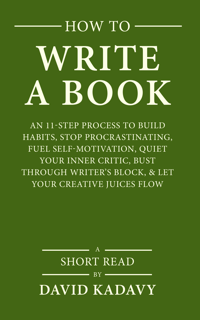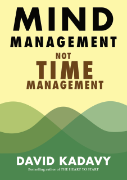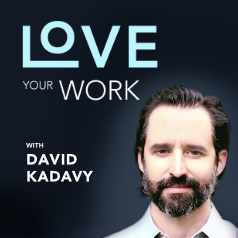Subscribe to blog updates via email »
Grippy & Slippy – Love Your Work, Episode 230
 One day, I was in a coworking space, here in Colombia, writing in my Moleskine notebook. One of the other co-workers came up to me and asked me a question.
One day, I was in a coworking space, here in Colombia, writing in my Moleskine notebook. One of the other co-workers came up to me and asked me a question.
He said, in Spanish, and with a sense of earnest curiosity, “Why are you writing in your notebook? Your computer is right in front of you. You can write much faster on your computer. Why aren’t you writing on your computer?”

WANT TO WRITE A BOOK?
Download your FREE copy of How to Write a Book »
(for a limited time)
That question really stuck with me, because I thought the answer was obvious — though I guess it wasn’t.
And it got me thinking about the tools we use to create, and why we use them.
Creativity is hard
You already know, from listening to episode 218 about the Four Stages of Creativity, that we don’t solve creative problems all at once. We need to go through stages. We need to go through Preparation, learning about the problem. From there, the problem goes through Incubation. Our subconscious works on it while we do something else. Only then can we reach Illumination — our “aha” moment. Finally, to get it ready to ship, we need to go through Verification.
And you also know, from being a human being, that when you’re up against a really tough problem, anything in the world suddenly becomes more appealing than that problem.
You’ll get “shiny object syndrome,” and want to escape to another project. Or you’ll check social media. I even find that I sometimes procrastinate on a really tough project by working on a slightly less tough project, that I have been procrastinating on until now.
Ayn Rand called it “white tennis shoes syndrome.” That if she came up against a tough problem while writing, she’d suddenly remember that there were some white tennis shoes in the closet that had smudges on them, and needed to be cleaned. Distractions, it seems, are nothing new.
Choose the tool for the creative job
But, I’ve found, depending upon where you are in the Four Stages of Creativity, the tool you use can make all of the difference in whether you keep moving forward, or fall off the tracks.
Through lots of trial and error, I have collected for myself the perfect arsenal of different tools for different situations. Here are some of them.
First thing in the morning, I write, with my eyes still closed, while still in bed, on my AlphaSmart. It’s a portable word processor. Discontinued. Available used on Amazon for about forty bucks.
I do my morning writing session on an iPad, with a wired external keyboard.
I have multiple 9” x 12” whiteboards lying around the house. I jot down ideas when they come to me. Sometimes I’ll even take a whiteboard to a cafe and write on it in long form.
Then, I have my 6” x 9” Moleskine Classic notebook. I also carry with me everywhere the tiniest notebook I could find: the Moleskine Volant, which is 2.5” x 4”.
And, of course, I have an iPhone SE, on which I occasionally brainstorm, if there’s no better tool around.
Sometimes, I even find it useful to simply pace around and talk out loud.
Finally, there’s plain, old-fashioned thinking. Just sitting in the park or swinging in my hammock, trying to navigate the twists and turns of a problem in my own mind.
Oops, I almost forgot. I also have a laptop. I try to avoid using it, but sometimes I simply need to be on a full-blown computer.
Some tools are slippy, some tools are grippy
Some of these tools are “slippy.” Some of these tools are “grippy.”
Slippy tools are tools are efficient. There’s little friction. You can create your final product quickly with a slippy tool.
Grippy tools are inefficient. There’s lots of friction. You can’t create your final product quickly with a grippy tool. Often, you can’t create your final product at all with a grippy tool.
Slippy tools sound great, but they have a drawback: Because slippy tools are so powerful, you can more easily get distracted. Yes, I can type fast and switch between documents and quickly do web research on my laptop. But I can also just as easily check my email, putz around on social media, or waste a couple of hours on Reddit.
Grippy tools sound terrible. Writing by hand is slow, and worst of all, you can’t even use the writing. When I write on a whiteboard, I have to erase it all eventually.
The right tool isn’t about the fastest output
Some people will protest: But David, you could get an iPad with Pencil, and you could write by hand, and it would convert the characters into text. Or, David, you could get a special pen that would store the writing as text in the cloud.
When I wrote about my AlphaSmart, my beloved portable word processor, people had all sorts of objections and suggestions. Why don’t you just get a Chromebook!?, they’d say. Or, Don’t you know there’s this word processor that costs ten times as much but that syncs with the cloud!? Or, my personal favorite, Why don’t you just get some self control and learn how to focus!?
Sigh. It Shakes My Head. This is the sad state of our world. This is how little respect we have for real thinking, and the space and time and mental energy that it requires. If we don’t wake up, we, as a species, are fucked.
Your tools & your thoughts are one
Fortunately, that was five years ago that I wrote about my AlphaSmart, and since then people are starting to get it. They’re finally starting to realize that they don’t have perfect control over their thoughts and actions. They’re finally starting to realize that others want control of their thoughts, and that others profit from that control. They’re finally starting to realize that the tools they decide to use shape those thoughts — whether that’s through enabling clearer thinking, or making them vulnerable to disruptions in their thinking.
Imagine the most simple example possible of a primate using a tool. Imagine a chimp fishing ants out of an anthill with a twig. In the moments when that chimp has her hand wrapped around the twig, she cannot use that hand for some other purpose.
This is the nature of tools. Tools give us new powers, but, in the process, tools take away other powers.
Imagine you’re Superman, and you have the power of X-ray vision. Wouldn’t you prefer to be able to turn off your powers of X-ray vision? If you had X-ray vision all of the time, that would actually suck. You’d be bumping into things, because you couldn’t see them. Everyone you saw would be naked. Before you get too excited, remember: Everyone you saw would be naked.
Tools help exercise thoughts, or record them. They rarely do both.
Here’s another thing that surprises most people when I tell them about my arsenal of tools. Much of what I produce on these tools disappears. My morning writing session on the AlphaSmart? When I’m done, I delete everything I just wrote. The writing I do on the whiteboards? I usually erase it all as soon as I’ve run out of space. When I speak out loud? I usually don’t record it. And when I sit and think? Those thoughts disappear into the ether.
Yes, if I really come across something great using any of these tools, I have options. I can write down a thought in a notebook, I can record my own speech, I can take a picture of a whiteboard. I can even hook up my AlphaSmart to a computer, and transfer my writing.
But that’s not the point. The point of each of these tools is not what I produce with these tools — it’s the way these tools enable thoughts.
In the early stages of any project, the thinking I do with these tools serves as Preparation, one of the Four Stages of Creativity I mentioned in episode 218. Preparation can be about research, but Preparation can just as easily be the exploration of a problem in your own mind. What do you think about this? What questions do you have? What are the ins and outs and ups and downs of it all?
I know that once I’ve done that Preparation, the next stage, Incubation, will take over. I know that when I return to the problem, I may have my “aha” moment. I may have my moment of Illumination.
Grippy tools for thinking, slippy tools for producing
This is why I want “grippy” tools for the early stages of any project. In a way, your progress on the project is itself slippy or grippy. When I’m in the early stages of a project, it’s like I’m scaling up a wet rock face. I don’t have a firm grasp of the problem. I need all of the grip I can get. I need any threat of dis-traction to be as far away as possible. I don’t need dis-traction. As Nir Eyal would say, I need traction.
Yes, after the tools — like training wheels on a bicycle — have enabled the thoughts, after I’ve explored the twists and windings of the problem in my head, I eventually have a grip on the problem. The rock face is no longer wet. I don’t need grippy hiking boots to keep going. I can wear more comfortable and nimble cross trainers.
When it’s time to turn clear thoughts into finished products — when the project is ready for Verification — then I can use a slippy tool, such as a laptop, connected to the internet, and all its myriad dis-tractions.
So the next time you’re working on a tough problem, and the next time that tough problem is making distractions more attractive, ask yourself: Am I using the right tool? Let go of the dangerous expectation of an instant breakthrough. Trade in your slippy tool for a grippy tool.
Thanks for sharing my work!
On Twitter, thank you to @geekosupremo, and @mtr_amg. Thank you to @balancethegrind for naming Love Your Work in their Top 26 podcasts you can listen to about work, life, and balance.
On Instagram, thank you to @wepublishhorror @success_from_books @jasonjclement, @ecemtombas, @shelbsimone, @eifgul, @wetherscold, @bluevalewriting, @mel_thecreative, @almahoffman, @michigan_st8ler
Image: Boaters Rowing on the Yerres, Gustave Caillebotte
New Book: Mind Management, Not Time Management (Preview Edition)
Read my upcoming book months before anyone else. Grab it, for a limited time, here.
Join the Patreon for (new) bonus content!
I've been adding lots of new content to Patreon. Join the Patreon »
Subscribe to Love Your Work
Listen to the Podcast
- Listen in iTunes >>
- Download as an MP3 by right-clicking here and choosing “save as.”
- RSS feed for Love Your Work
Theme music: Dorena “At Sea”, from the album About Everything And More. By Arrangement with Deep Elm Records. Listen on Spotify »


